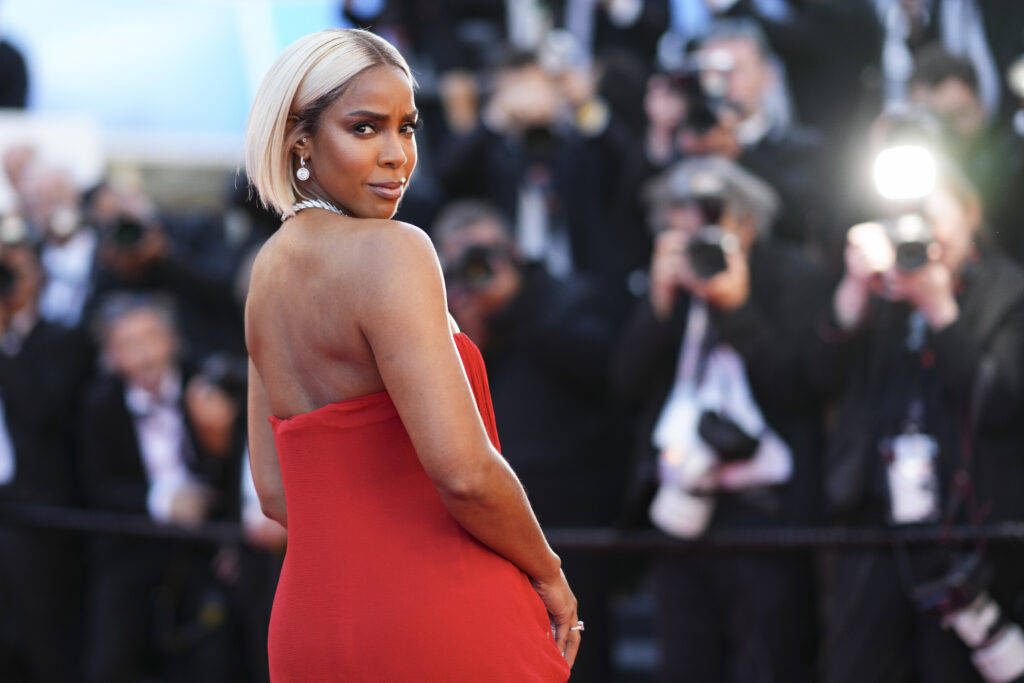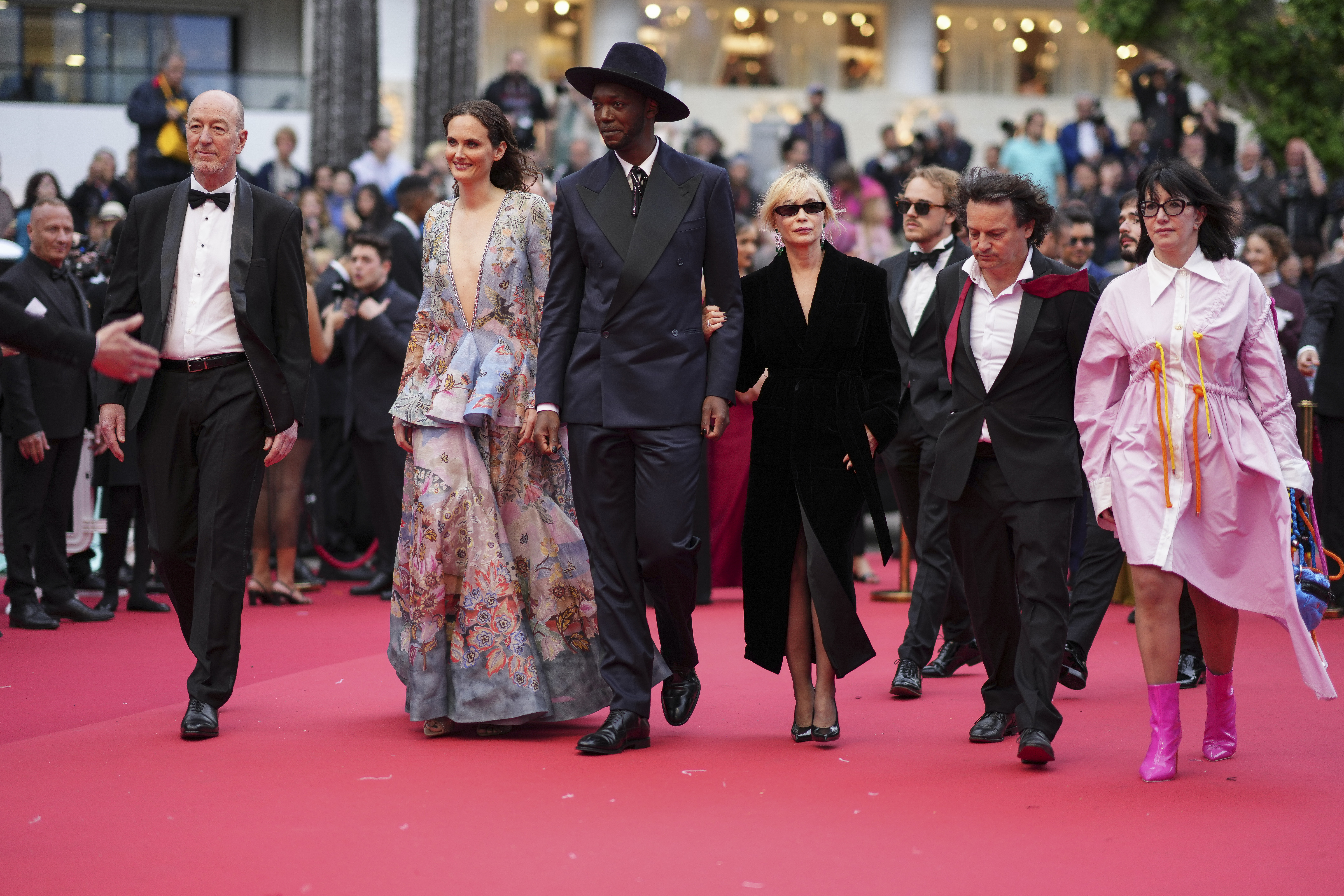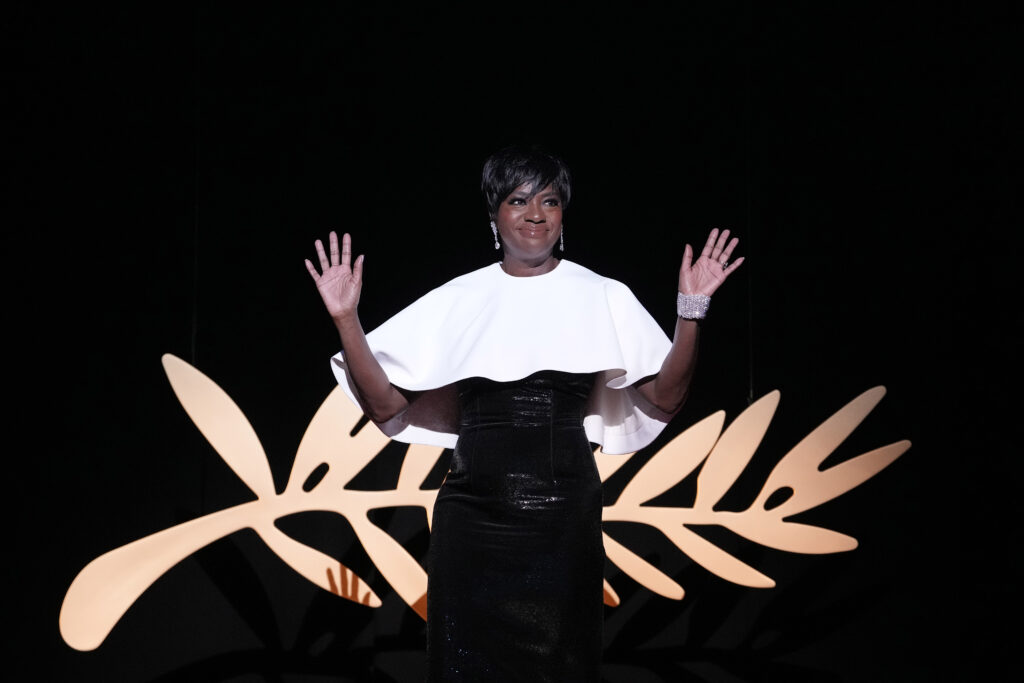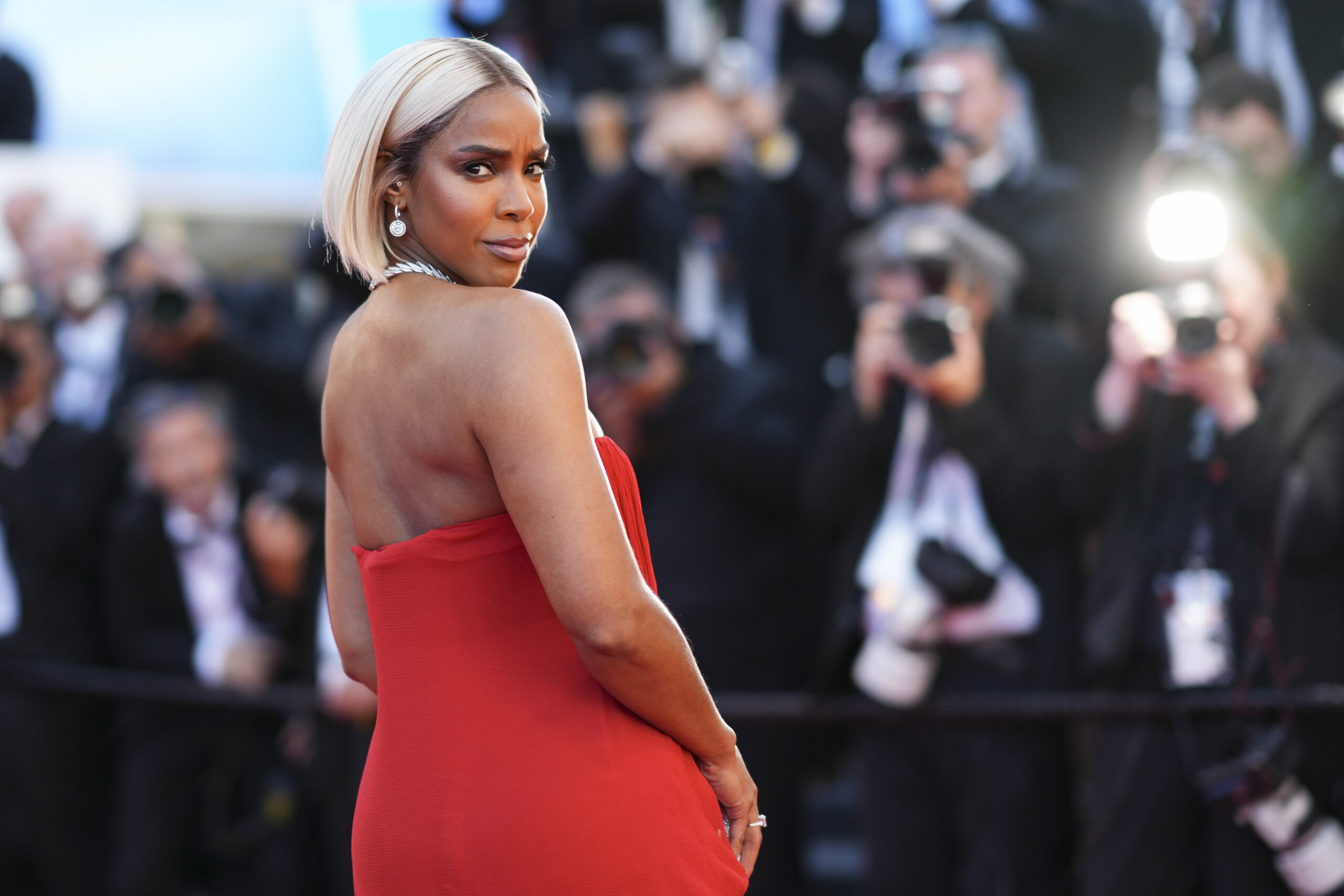The Cannes Film Festival in France has a problematic reputation for how it treats Black people.
The 76th annual festival—which took place from May 14 to May 25—has now come under fire from the general public, with many people accusing it of disrespecting Black people and giving white people preferential treatment. Black women in particular have been speaking out about this problem, which received worldwide attention after a May 21 incident involving singer/actress Kelly Rowland reacting to how she was treated by a white security employee during a Cannes Film Festival premiere.
The controversy over this incident speaks to a larger issue of how Black women often have to deal with a double standard when it comes to getting respect. What wasn’t as widely reported was the fact that the Cannes Film Festival this year chose not to include any movies from Black directors for the In Competition category for the festival’s biggest prizes, while several movies from white and Asian directors were chosen for this category.

Even though Rowland got much public support, she also received a lot of criticism and hate from some media outlets and people who were quick to call her a spoiled diva while overlooking that many white celebrities at same Cannes Film Festival event as Rowland were not treated in the same pushy manner by the festival’s white security personnel. The racism accusations against the Cannes Film Festival arose after videos and photos went viral of an unidentified white female security employee putting her hands up in an aggressive manner while standing very close to Rowland, Dominican actress Massiel Taveras, and South Korean pop star Yoona at separate red-carpet events at the festival, in order to force the celebrities of color to stop posing for photos on the red carpet and enter the building.
The security employee also put out her hands and used her body to block and restrict the movements of these celebrities of color, but several white celebrities at the same Cannes Film Festival events were not rushed and blocked in the same way by Cannes Film Festival security personnel. Several videos from the same events at this year’s festival show white celebrities—such as German-born TV host/fashion model Heidi Klum, American actress Elle Fanning, and French actress Catherine Deneuve—being allowed to take their time on the red carpet (including on the venue’s stairs, where many celebrities are allowed to pose for photos) and were not bodily blocked and were not accosted by security personnel in attempts to be forced into the building.
Black News & Views reported in 2023 that the Cannes Film Festival (considered one of the world’s most prestigious film festivals) has a long history of not being as welcoming to talented and qualified Black filmmakers as it is to filmmakers of other races who have similar talent and qualifications.
RELATED: Black filmmakers say the melanin-challenged Cannes Film Festival can do better
In 2024, this pattern continued: The Cannes Film Festival did not choose any movies from Black directors for the In Competition category, which is the category for the Palme d’Or, the festival’s biggest prize, and other major awards at the gathering, such as Best Director, Best Actor, Best Actress, Grand Prix, Jury Prize, and Best Screenplay.
The Palme d’Or is the festival’s equivalent of Best Picture. This year, there were 22 movies chosen for the In Competition category. The Palme d’Or winner for 2024 is “Anora,” directed by Sean Baker, a white American man. “Anora” is a comedy/drama about an American exotic dancer who marries into a Russian oligarch family.
When the Cannes Film Festival chooses a Black director’s movie for the In Competition category, it’s usually one movie in that given year from a Black director, who is almost always male. By contrast, every year for the In Competition category, the Cannes Film Festival chooses several movies from directors who are white and Asian. A movie from a Latino director who isn’t white might or might not be chosen. The vast majority of the chosen movies are from white directors. With these odds stacked against Black directors, it’s no wonder that a movie from a Black director has not yet won the Palme d’Or. In addition, as of this writing, the Cannes Film Festival has never awarded the Best Director prize to a Black person.
In 2024, three Black people won jury-decided awards at the Cannes Film Festival, but these award recipients all had to share the prizes with other people. Haitian filmmaker Raoul Peck won the L’Oeil D’or Prize for Best Documentary, for directing “Ernest Cole: Lost and Found,” which was awarded the prize in a tie with “The Brink of Dreams,” directed by Arab-Egyptian filmmakers Nada Riyadh and Ayman El Amir. Afro-Latina actress Zoë Saldaña shared the Best Actress award with her “Emilia Pérez” co-stars Adriana Paz, Karla Sofía Gascón, and Selena Gomez. Black/biracial Australian actress Sophie Wilde (a breakout star of the 2023 horror film “Talk to Me”) and white American actor Mike Faist (a co-star of the 2024 tennis drama “Challengers”) were both awarded the Trophée Chopard, a prize for up-and-coming young actors and actresses.
The Cannes Film Festival juries have about five to nine people per jury. Some juries might not have any Black people, but the juries that do have any Black people usually have just one Black person per jury. A Black person is rarely selected to be president of a jury. The Cannes Film Festival’s grand jury selects the winners for the In Competition awards. French actor Omar Sy was the only Black person on the festival’s nine-person grand jury in 2024.
Oscar-winning filmmaker Spike Lee is the only Black person so far to be chosen as president of the Cannes Film Festival grand jury. Lee served as the grand jury president in 2021. He was originally selected in 2020, but the festival was canceled that year due to the COVID-19 pandemic.

In 2024, filmmaker Baloji (a Congolese-born artist currently living in Belgium) was the only Black person chosen as a Cannes Film Festival jury president this year. He served as co-president (with white French actress Emmanuelle Béart) for the Caméra d’Or prize, an award category for directors’ first feature films. In 2023, Baloji became a rare Black director winner of a Cannes Film Festival award, when he received the New Voice prize for his feature-film directorial debut, “Omen.”
RELATED: 5 African filmmakers to watch
The Cannes Film Festival did not respond to requests from Black News & Views for comment on these racial issues at the event. Lee, who is outspoken about civil rights pertaining to Black people, also did not respond to Black News & Views’ request for comment. As of this writing, two movies directed by Lee have had their world premieres at Cannes: 1989’s “Do the Right Thing” and 2018’s “BlacKkKlansman.” The latter film won the festival’s Grand Prix Award. Baloji also did not respond to a request for comment from Black News & Views.
As previously reported, some Black people who have attended the Cannes Film Festival—including Deadline associate editor Valerie Complex and Variety senior awards editor Clayton Davis (who identifies as Afro-Latino)—have spoken out about being treated rudely by Cannes Film Festival security personnel who want to police Black people for doing nothing wrong, while white people at the same events are not given the same disrespectful scrutiny by the festival’s security personnel. Rowland has now joined the list of Black people who’ve experienced the same apparent racism and have spoken out about it.

The incident with Rowland occurred when she attended the world premiere of “Marcello Mio.” Rowland defended herself against the security employee, who invaded Rowland’s personal space and put her hand out in a blocking motion to steer Rowland into the building. In response, Rowland pointed a finger at the security employee and said, “Don’t talk to me like that. Don’t talk to me like that. You’re not my mother. I told you not to talk to me like that.”
It is unknown what the security employee said to Rowland, but some news media inaccurately reported that Rowland was the physical aggressor who instigated this conflict. Video recordings of the incident show two unidentified white people (a man and a woman) apparently coming to Rowland’s defense and telling the security employee to back off from Rowland.
In a video interview with the Associated Press on May 23, Rowland commented on the security employee and the incident: “That woman knows what happened. I know what happened. I have a boundary and I stand by those boundaries. There were other women that attended that carpet who did not quite look like me and they didn’t get scolded, or pushed off, or told to get off. I stood my ground and she felt like she had to stand hers. But I stood my ground.”
On May 19, Yoona walked the red carpet for the premiere of “Horizon: An American Saga” and the same security employee who accosted Rowland was seen using similarly aggressive tactics with Yoona, while white celebrities walking the red carpet in the same area at the event did not get the same pushy treatment.
On May 22, Taveras attended the world premiere of “The Count of Monte Cristo,” where the same female security guard put her hands on Taveras to make her enter the building while Taveras was posing for photos. In response to the unnecessary physical forcefulness, Taveras pushed the security employee away.
As of this writing, Yoona has not directly commented on the aggressive treatment that she received from this employee at the Cannes Film Festival. However, Taveras posted this statement on her Instagram account on May 26: “I want to thank all of you for this incredible support, today more than ever we need to stay together, suport [sic] each ether [sic] protect our souls, have strong boundaries and stand for our rights, let’s show some love and respect to the extraordinary @kellyrowland a pure soul, a talented, classy, educated woman of color that represents with respect all of US.”
Taveras’ statement continued: “I’m impressed how you handled sister, I didn’t now [sic] that happened to you first I was very impressed how calm and genteel you wr [sic] because in my case I was tired of the abuse, —BLACK WOMAN MATTERS- we are not going to be in silence on situations like that, we need respect, it’s enough. I hug you queen #kellyrowland, thanks for giving us sooo much god bless your heart.”
Diversity in Cannes—an independent activist group that is not affiliated with the Cannes Film Festival but advocates for diversity at the festival by hosting various programs and events—posted a statement on Facebook about the Rowland incident. A photo of Rowland at this year’s festival was accompanied by this message: “BOYCOTT CANNES? Seriously at a loss for words. The blatant disrespect for black women at the Cannes Film Festival is disheartening.” Diversity in Cannes (which launched the Black Women Cannes initiative this year) did not respond to Black News & Views’ request for comment on these racial issues at Cannes.
Diversity in Cannes founder Yolonda Brinkley—who has attended the Cannes Film Festival every year since 2009—gave her perspective on the Kelly Rowland incident and racism at the festival in an Instagram video on May 24. Brinkley, who said she saw the full video, commented that much of the media inaccurately put the blame on Rowland for what happened. Brinkley described the security employee as being “aggressive” because Rowland already had people escorting her up the stairs. Brinkley said that the news headlines should have been “Cannes employee unnecessarily harasses Kelly Rowland as she ascends the Cannes red carpet.” Brinkley added, “What happened to Kelly Rowland is not okay.”
In the Instagram video, Brinkley also said that the Cannes Film Festival’s racism against Black people, particularly Black women, is obvious and ongoing.
“The white patriarchy is the problem,” she said about the root cause of this racism. “There is blatant disrespect, disregard for Black women on the ground in Cannes. … It’s a sin and a shame.”








